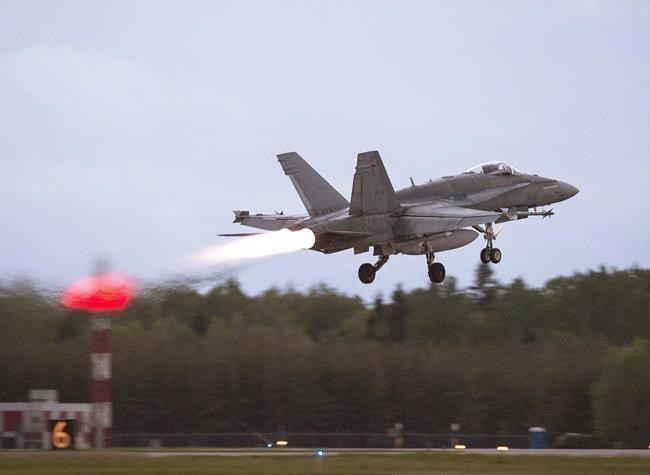OTTAWA — A senior Canadian general in charge of protecting North American airspace says Russia has the capability to strike this continent, bolstering the need for improved defensive systems.
Russia has spent years investing in its military, including when it comes to things like cruise missiles and developing a variety of non-nuclear weapons, among other defence measures.
Protecting North America from the threat of a cruise-missile attack is the job of the North American Aerospace Defense Command, better known by the acronym Norad.
Maj.-Gen. Eric Kenny, commander of the Canadian Norad region, says Russia has the capabilities, if it so desires, to strike within North America through different means, although he doesn't expect imminent attack.
Kenny made the comments in an interview from Yellowknife as Norad conducted a previously planned exercise that included Canadian CF-18 fighter jets.
Kenny says the exercise aims to give new and veteran members of the Forces a feel for operating in the North, and ideally to give Norad a leg up on adversaries.
"But the reality is, we can only do so much with the force that we have," Kenny said. "So we make very conscious and deliberate decisions on what that means within the Norad context."
Successive Canadian and American governments have vowed to modernize systems as part of a sweeping update to Norad, which was first created during the Cold War to protect against a Soviet attack.
The federal Liberals set aside an initial $163 million for the effort last year.
The Defence Department's forward-looking plan for the fiscal year that begins in April noted that a number of the modernizing initiatives "have yet to be fully defined and funded." The report specifically mentioned the North Warning System, a string of radars built in the Canadian Arctic in the 1980s.
Kenny said officials are looking closely at needed infrastructure, ensuring it is the right size and at the right location, and noted the planned replacement of the aging CF-18s.
He also expects an announcement in the next year on the long-delayed procurement, with delivery of new planes by the middle is this decade.
The government's main spending estimates released earlier this month listed a $25.9 billion budget for the Department of National Defence, slightly above the $25.7 billion authorized for the department so far this fiscal year. Within next year's allotment was almost $4.8 billion for procurement.
Finance Minister Chrystia Freeland has hinted that more money may be coming for the military in her upcoming budget as Canada sees many of its allies boosting their defence spending.
Among NATO allies, the goal is to make defence spending equal to two per cent of the size of domestic economies. The latest figures from the alliance put Canada’s defence spending at 1.39 per cent of the country’s gross domestic product in 2021.
Defence Minister Anita Anand has been meeting with her NATO counterparts this week in Brussels, including a one-on-one Thursday with U.S. Defense Secretary Lloyd Austin, as the military alliance debates next steps in Ukraine.
"The discussions I had while at NATO reinforce the shared commitment of allies and partners to supporting Ukraine and the need to adapt the alliance’s deterrence and defence posture," Anand said in a statement.
Prime Minister Justin Trudeau is expected to join other NATO leaders at a special summit next week.
Some of the military members taking part in the Norad exercise in the North were part of Canadian efforts to train Ukrainian security forces before Russia invaded three weeks ago.
Kenny said the fighting in Ukraine is striking a personal chord with them. He said Canadian soldiers are proud of the training they provided, and seeing the results of some of that training now, but are equally disturbed by the impact on Ukrainians.
"The world is not safe as some may think it is," Kenny said.
"When certain actors, in particular peer states, decide to commit military forces, you have what you have at that moment."
The federal government on Thursday looked to tighten the financial screws on allies of Russian President Vladimir Putin.
Foreign Affairs Minister Mélanie Joly said the government is slapping economic sanctions on 22 senior defence officials in Belarus who supported Putin’s action, including by allowing Belarus to be used as a launch pad for the Russian invasion.
This report by The Canadian Press was first published March 17, 2022.
Jordan Press, The Canadian Press



